Table of Contents
- Introduction
- Editor’s Choice
- Legal Process Outsourcing Market Overview
- Industry Profile for Legal Occupations
- Current and Planned Legal Process Outsourcing (LPO) – By-Service Statistics
- Legal Process Outsourcing Provider Statistics
- Top Countries and Regions Where Law Firms Prefer to Outsource
- Time Management in Legal Process Outsourcing
- New Trends in Legal Process Outsourcing
- Recent Developments
- Conclusion
- FAQs
Introduction
Legal Process Outsourcing Statistics: Legal Process Outsourcing (LPO) involves delegating legal tasks to external service providers. Enabling organizations to focus on core activities while accessing cost-effective and scalable solutions.
LPO offers access to specialized expertise, leveraging advanced technologies to streamline processes and ensure confidentiality and compliance with regulations.
While globalization has facilitated the expansion of LPO services worldwide, effective risk management is essential to mitigate potential drawbacks.
Future trends in the LPO industry may include increased adoption of AI-driven solutions and a heightened focus on cybersecurity by Generative AI in Legal with the help of Legal AI Software.
Essentially, LPO presents a strategic opportunity for organizations to optimize legal operations, reduce costs, and enhance efficiency.
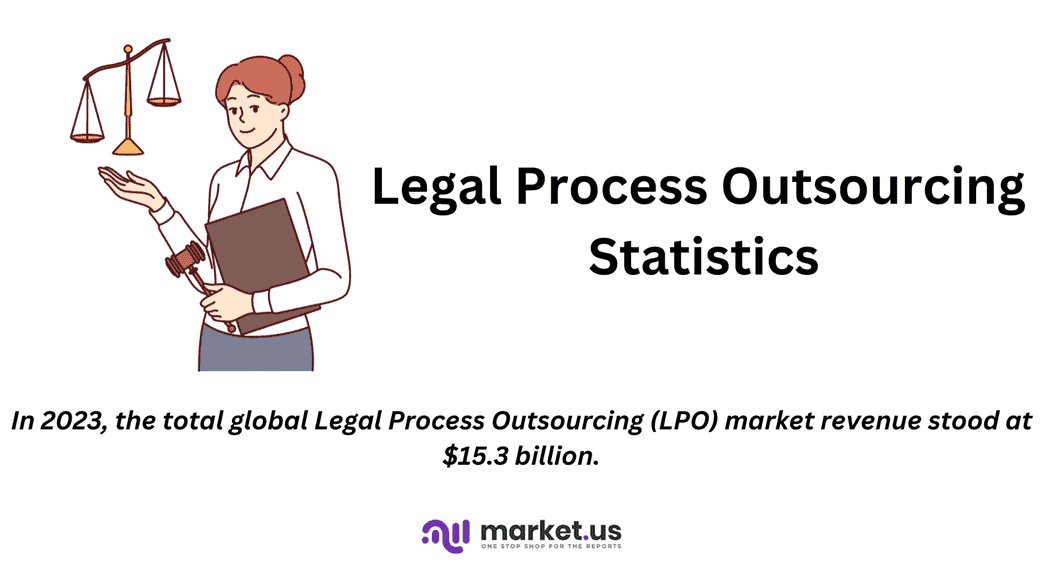
Editor’s Choice
- In 2023, global Legal Process Outsourcing (LPO) market revenue stood at $15.3 billion.
- The market will culminate in a total revenue of $132.6 billion by 2033. With off-shore outsourcing contributing $105.28 billion and on-shore outsourcing generating $27.32 billion.
- In the competitive landscape of the global Legal Process Outsourcing (LPO) market. Cobra Legal Solutions LLC leads with a share of 15%.
- The global Legal Process Outsourcing (LPO) market is geographically diverse. The Asia-Pacific (APAC) region dominates the market with a substantial 63% share.
- In 2014, legal opinions were the most commonly outsourced service. With 67% currently outsourced and an additional 23% planned for outsourcing.
- The geographical reach of Legal Process Outsourcing (LPO) providers is prominently led by India, which accounts for 59% of the market.
- For onsite services, administrative skills are priced between $60 and $320 per day, with an average rate of $201.
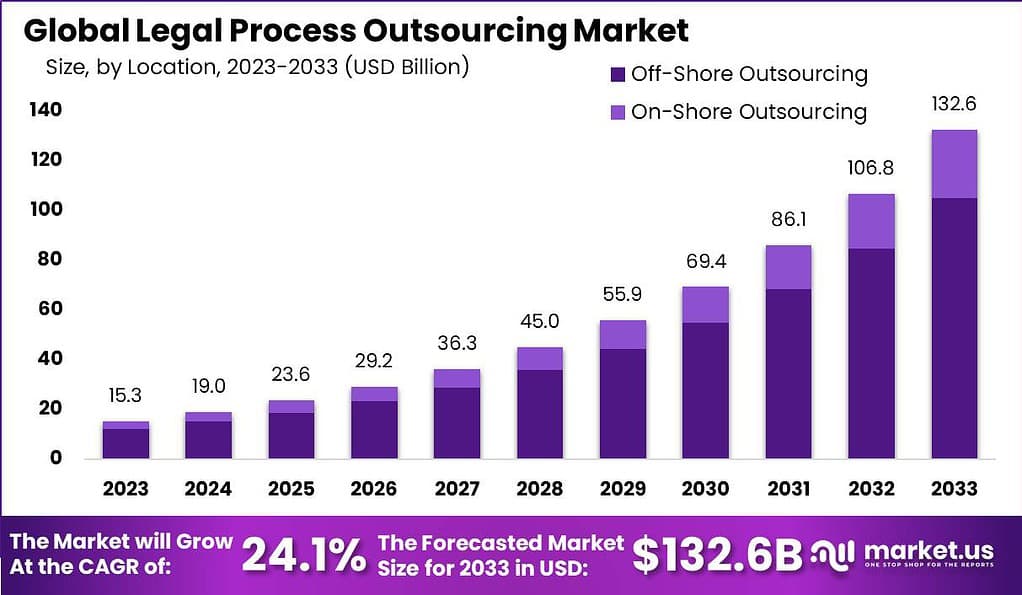
Legal Process Outsourcing Market Overview
Global Legal Process Outsourcing Market Size Statistics
- The global Legal Case Management Software Market is anticipated to be USD 5.9 billion by 2033. It is estimated to record a steady CAGR of 13.4% in the Forecast period 2023 to 2033. It is likely to total USD 1.9 billion in 2024.
- The global Legal Process Outsourcing (LPO) market has experienced significant growth in recent years. With revenues rising from $15.3 billion in 2023 to an estimated $132.6 billion by 2033.
- This upward trajectory highlights a robust compound annual growth rate (CAGR) of 24.1%. Driven by the increasing need for cost-effective legal services and the growing adoption of advanced technologies such as artificial intelligence and machine learning in legal processes.
- In 2024, the market is projected to reach $19.0 billion, and by 2025. It is expected to grow to $23.6 billion.
- This trend continues as the market size is anticipated to expand to $29.2 billion in 2026 and $36.3 billion in 2027.
- By 2028, the market is forecasted to reach $45.0 billion, followed by $55.9 billion in 2029.
- The growth momentum is expected to persist, with revenues hitting $69.4 billion in 2030, $86.1 billion in 2031, and $106.8 billion in 2032, culminating in a remarkable $132.6 billion by 2033.
- This substantial growth underscores the increasing reliance on LPO services across various industries seeking to streamline operations and reduce legal costs.
(Source: market.us)
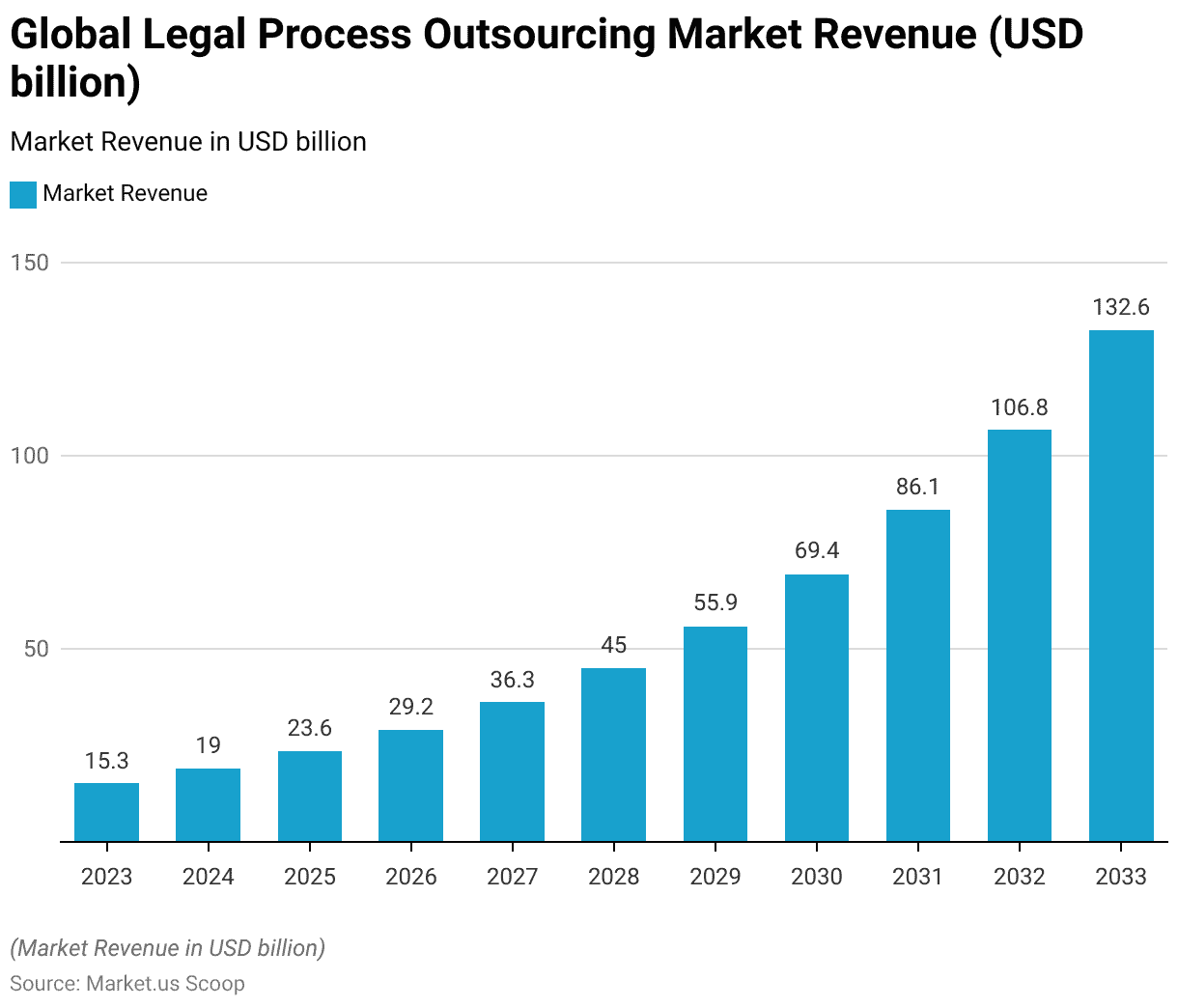
Global Legal Process Outsourcing Market Size – By Location Statistics
- The global Legal Process Outsourcing (LPO) market, segmented by location, demonstrates a notable growth trajectory from 2023 to 2033.
- In 2023, the total market revenue stood at $15.3 billion, with off-shore outsourcing contributing $12.15 billion and on-shore outsourcing generating $3.15 billion.
- By 2024, the market is projected to grow to $19.0 billion. With off-shore and on-shore revenues increasing to $15.09 billion and $3.91 billion, respectively.
- This upward trend continues, with total market revenue reaching $23.6 billion in 2025 ($18.74 billion off-shore and $4.86 billion on-shore), $29.2 billion in 2026 ($23.18 billion off-shore and $6.02 billion on-shore), and $36.3 billion in 2027 ($28.82 billion off-shore and $7.48 billion on-shore).
- By 2028, the market is expected to hit $45.0 billion, with off-shore and on-shore revenues at $35.73 billion and $9.27 billion, respectively.
- The growth accelerates further, with total revenues projected at $55.9 billion in 2029 ($44.38 billion off-shore and $11.52 billion on-shore), $69.4 billion in 2030 ($55.10 billion off-shore and $14.30 billion on-shore), and $86.1 billion in 2031 ($68.36 billion off-shore and $17.74 billion on-shore).
- By 2032, the market is anticipated to reach $106.8 billion, with off-shore revenues of $84.80 billion and on-shore revenues of $22.00 billion.
- The market will culminate in a total revenue of $132.6 billion by 2033. With off-shore outsourcing contributing $105.28 billion and on-shore outsourcing generating $27.32 billion. This substantial growth reflects the increasing demand for LPO services. Driven by the need for cost efficiency and the adoption of advanced technologies in legal processes.
(Source: market.us)
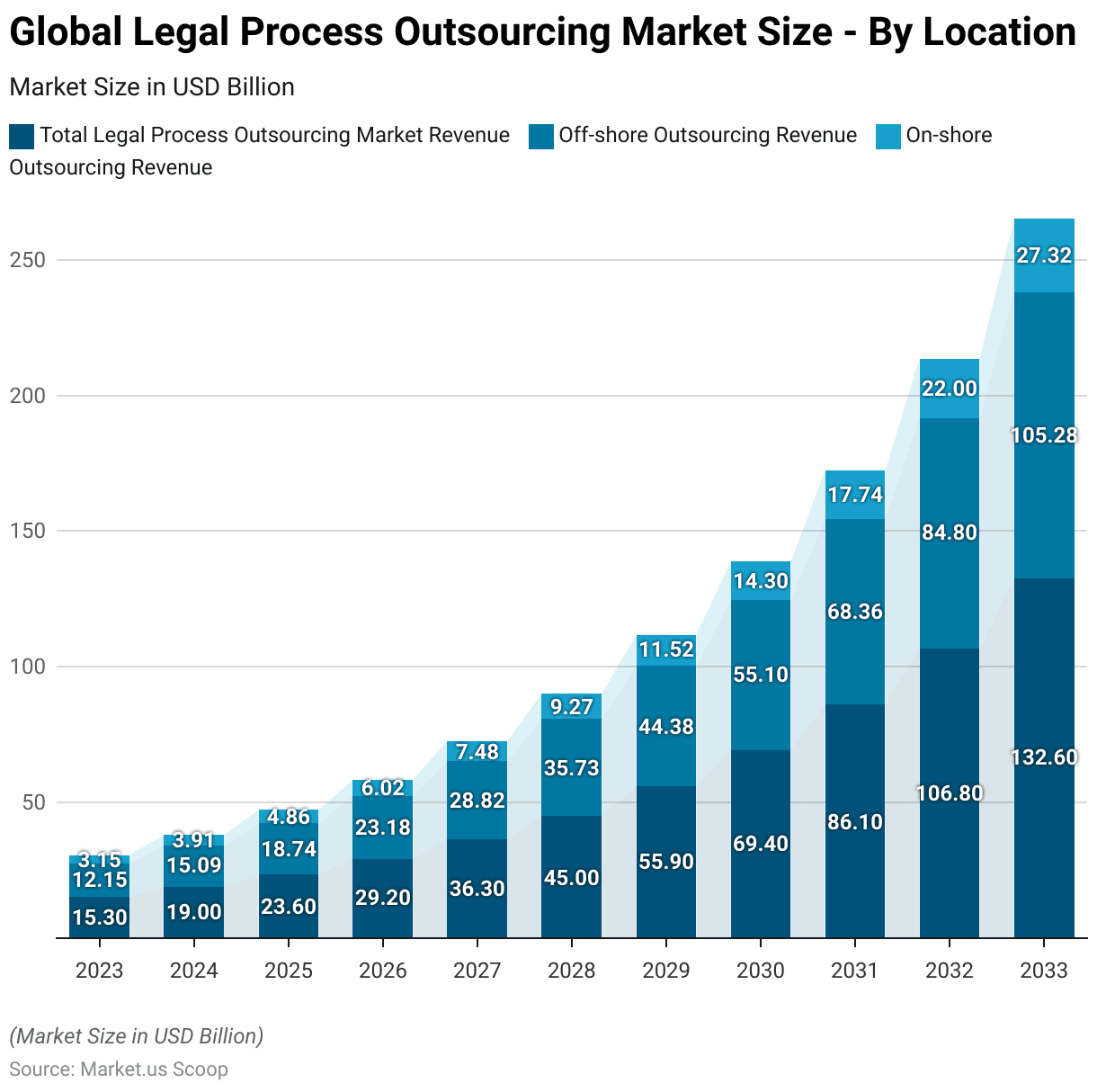
Competitive Analysis of the Global Legal Process Outsourcing Market Statistics
- The global Legal Process Outsourcing (LPO) market is characterized by a diverse competitive landscape with several key players holding significant market shares.
- Cobra Legal Solutions LLC leads the market with a share of 15%, followed closely by Clairvolex and Evalueserve, each holding 12%.
- CPA Global Ltd. controls 11% of the market, while Exigent and Integreon Managed Solutions Inc. each account for 9%.
- Infosys Ltd. holds an 8% share, reflecting its substantial presence in the industry.
- Clutch Group commands 10% of the market.
- Additionally, other key players collectively contribute to 14% of the market share, indicating a competitive and dynamic market environment.
- This distribution of market shares highlights the varied capabilities and strategic positions of leading firms within the LPO sector.
(Source: market.us)
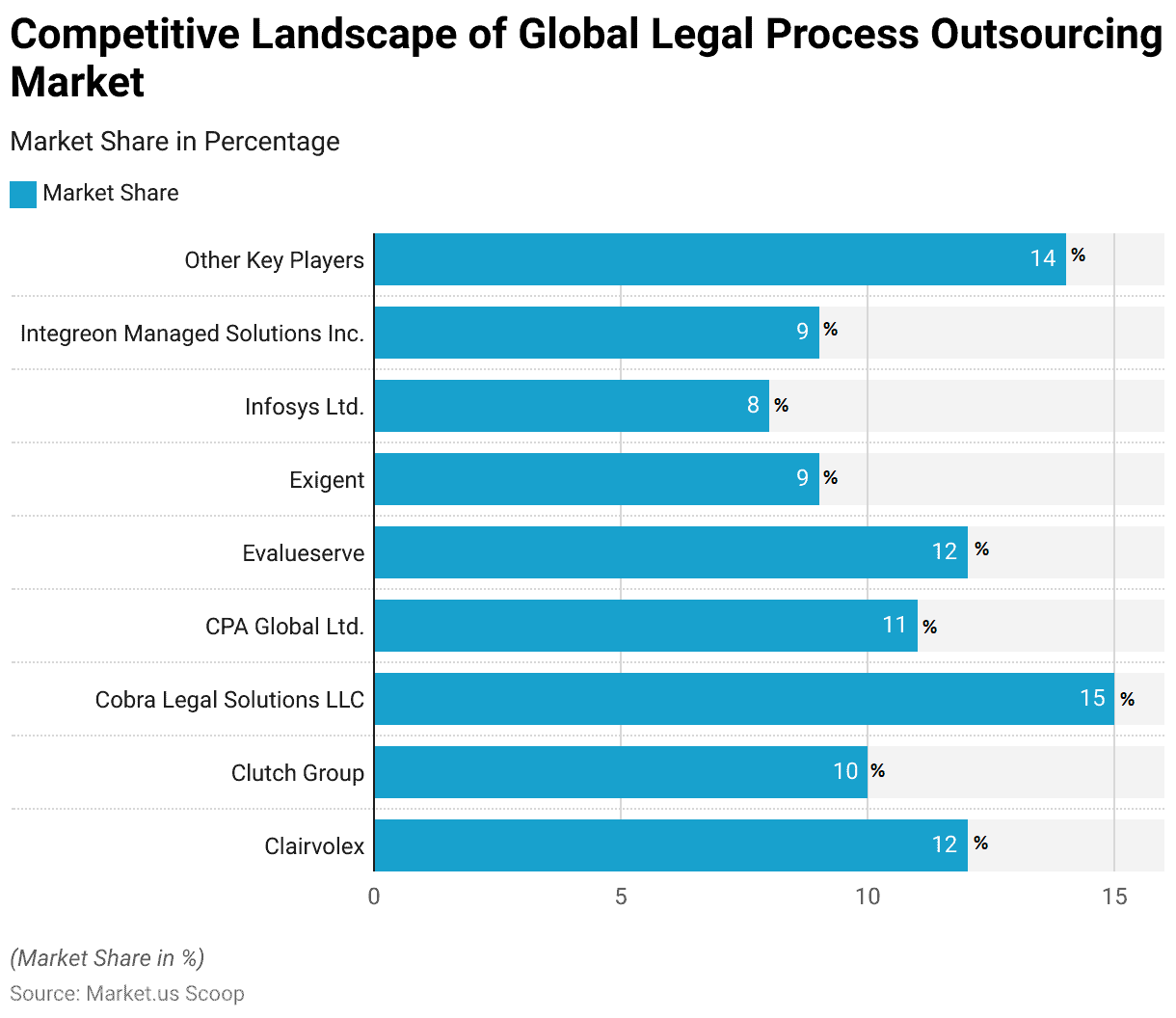
Regional Analysis of the Global Legal Process Outsourcing Market
- The global Legal Process Outsourcing (LPO) market is geographically diverse. The Asia-Pacific (APAC) region dominates the market with a substantial 63% share.
- North America follows, accounting for 20% of the market. Reflecting its significant demand for cost-effective legal services and advanced technological integration.
- Europe holds an 8% share, indicating a growing acceptance of LPO solutions within its legal sector.
- Latin America contributes 6% to the global market, while the Middle East and Africa (MEA) region accounts for the remaining 3%.
- This distribution underscores the leading role of APAC in driving the LPO market’s growth. Supported by favorable economic conditions and a robust outsourcing infrastructure.
(Source: market.us)
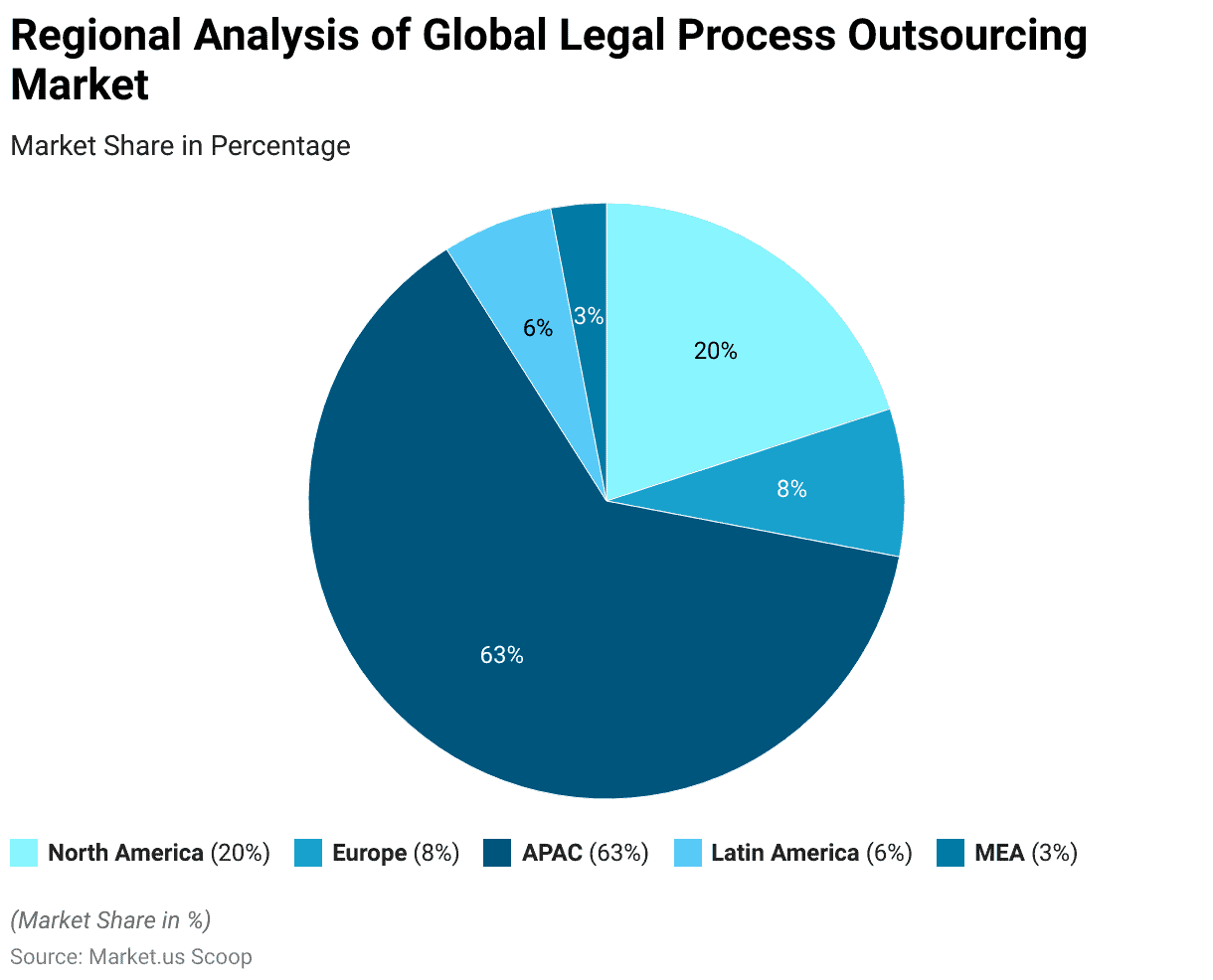
Industry Profile for Legal Occupations
Industries with the Highest Levels of Employment in Legal Occupations
- In the United States, legal occupations are most prevalent in several key industries, with the highest levels of employment found in the Legal Services sector.
- This industry employs 753,360 individuals, accounting for 63.45% of its total workforce.
- Local government, excluding schools and hospitals, employs 98,390 legal professionals, representing 1.79% of its employment.
- State government, excluding schools and hospitals, follows with 94,610 legal workers, making up 4.46% of its workforce.
- The combined category of federal, state, and local government (excluding schools, hospitals, and the U.S. Postal Service) employs 76,210 individuals in legal roles, constituting 3.56% of its total employment.
- Additionally, the insurance carriers’ industry employs 32,910 legal professionals, which accounts for 2.69% of its workforce.
- These figures underscore the significant demand for legal expertise across various sectors, with the Legal Services industry being the predominant employer of legal professionals in the U.S.
(Source: U.S Department of Labour Bureau of Labor Statistics)
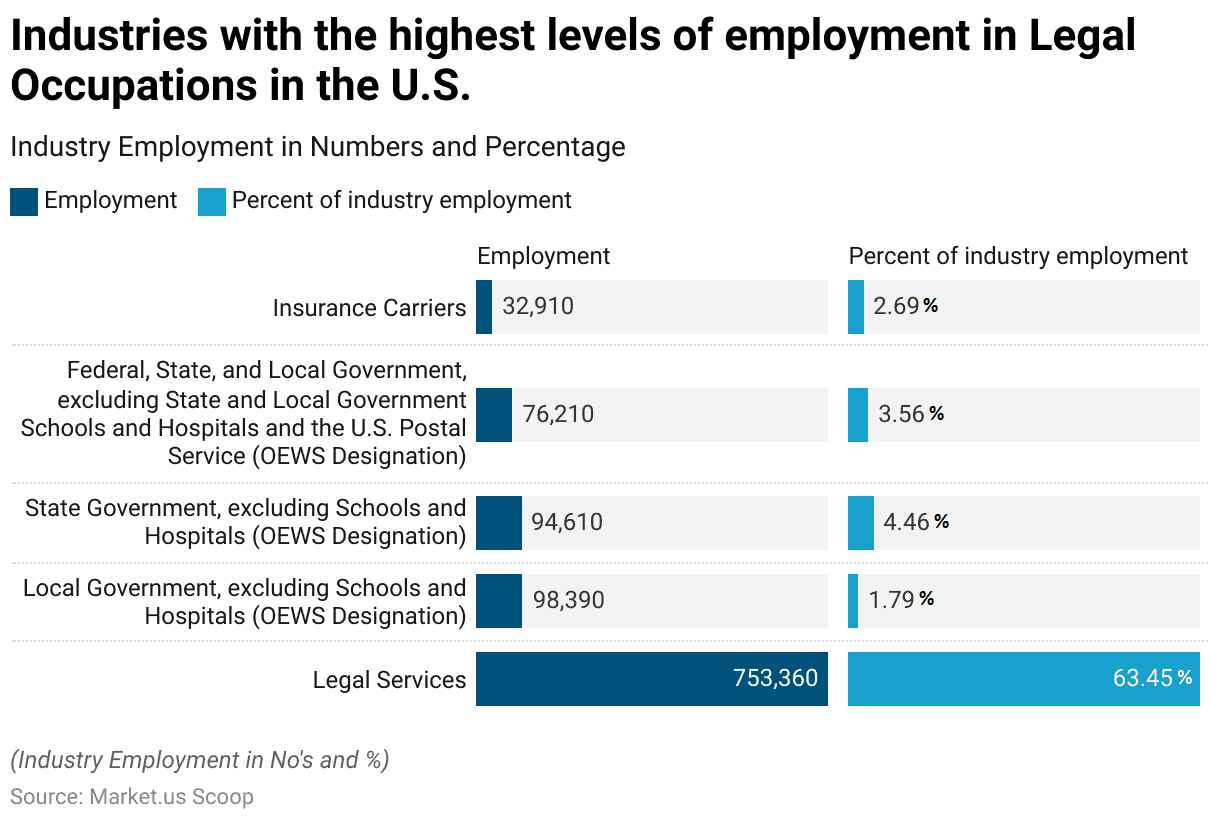
Top Paying Industries for Legal Occupations
- The top-paying industries for legal occupations in the United States offer lucrative salaries, reflecting the specialized nature of these roles.
- In the Other Ambulatory Health Care Services industry, legal professionals earn an hourly mean wage of $134.25, translating to an annual mean wage of $279,240, despite accounting for only 0.05% of the industry’s employment with 160 individuals.
- The Promoters of Performing Arts, Sports, and Similar Events industry employs 210 legal professionals, or 0.13% of its workforce, with an hourly mean wage of $123.32 and an annual mean wage of $256,500.
- Legal occupations in the Water, Sewage, and Other Systems industry, though comprising just 0.07% of employment with 40 workers, offer an hourly mean wage of $121.56 and an annual mean wage of $252,850.
- Support Activities for Rail Transportation also employs 40 legal professionals, representing 0.1% of its workforce, with an hourly mean wage of $120.78 and an annual mean wage of $251,210.
- Finally, the Aerospace Product and Parts Manufacturing industry employs 520 legal professionals, or 0.1% of its workforce, with an hourly mean wage of $118.30 and an annual mean wage of $246,060.
- These industries, while employing a relatively small number of legal professionals, offer some of the highest wages in the field.
(Source: U.S Department of Labour Bureau of Labor Statistics)
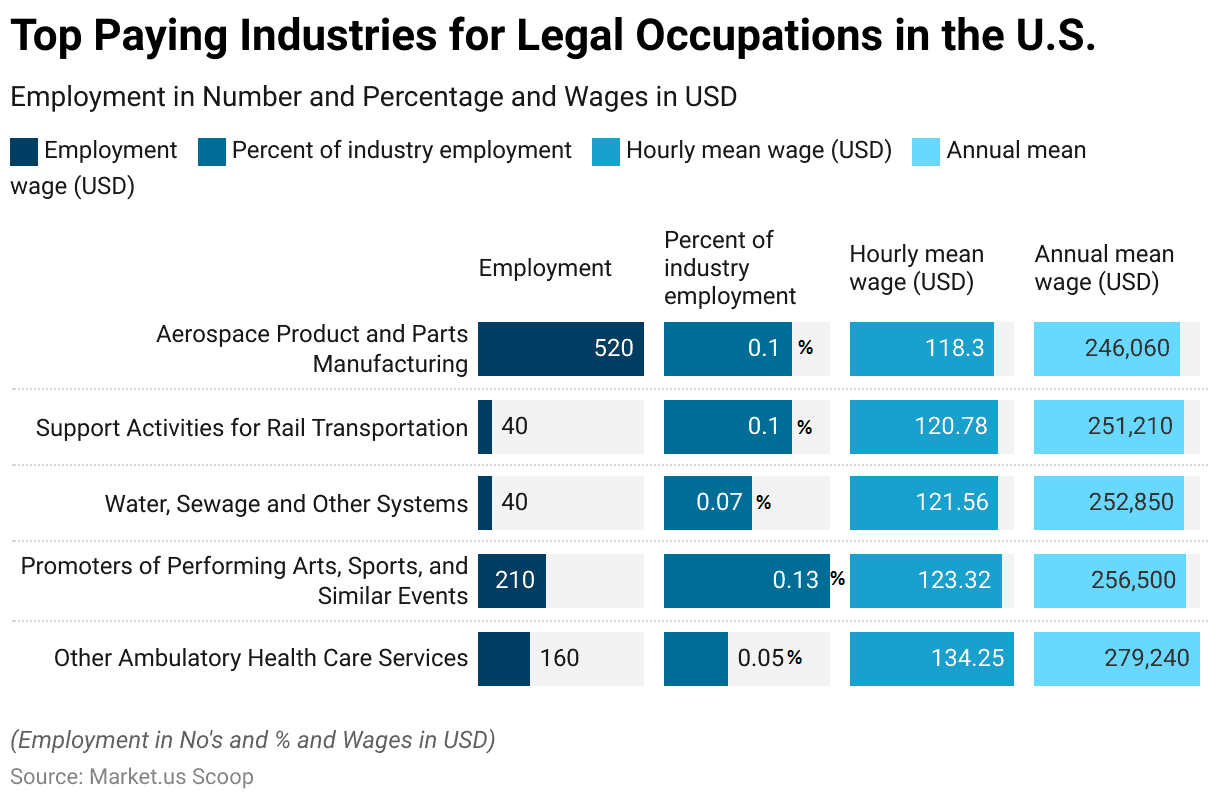
Current and Planned Legal Process Outsourcing (LPO) – By-Service Statistics
- In 2014, the landscape of legal process outsourcing (LPO) services was marked by varied levels of current outsourcing and planned future outsourcing across different legal services.
- Legal opinions were the most commonly outsourced service, with 67% currently outsourced and an additional 23% planned for outsourcing.
- Legal counsel followed closely, with 65% currently outsourced and 15% planned for future outsourcing.
- Patent review and drafting services saw 57% of current outsourcing, with 14% planned for outsourcing.
- Legal research and analysis had 56% currently outsourced and a notable 26% planned for future outsourcing.
- Negotiation support and paralegal support services were each currently outsourced by 43%, with future outsourcing plans at 14% and 17%, respectively.
- Contract drafting services were currently outsourced at 37%, with 18% planned for outsourcing.
- E-Discovery services showed 35% current outsourcing and a significant 25% planned for future outsourcing.
- Finally, billing services had the lowest current outsourcing level at 18%, but with 21% planned for future outsourcing.
- This data highlights the ongoing reliance on LPO services across various legal functions and the anticipated growth in outsourcing activities within the legal sector.
(Source: Statista)
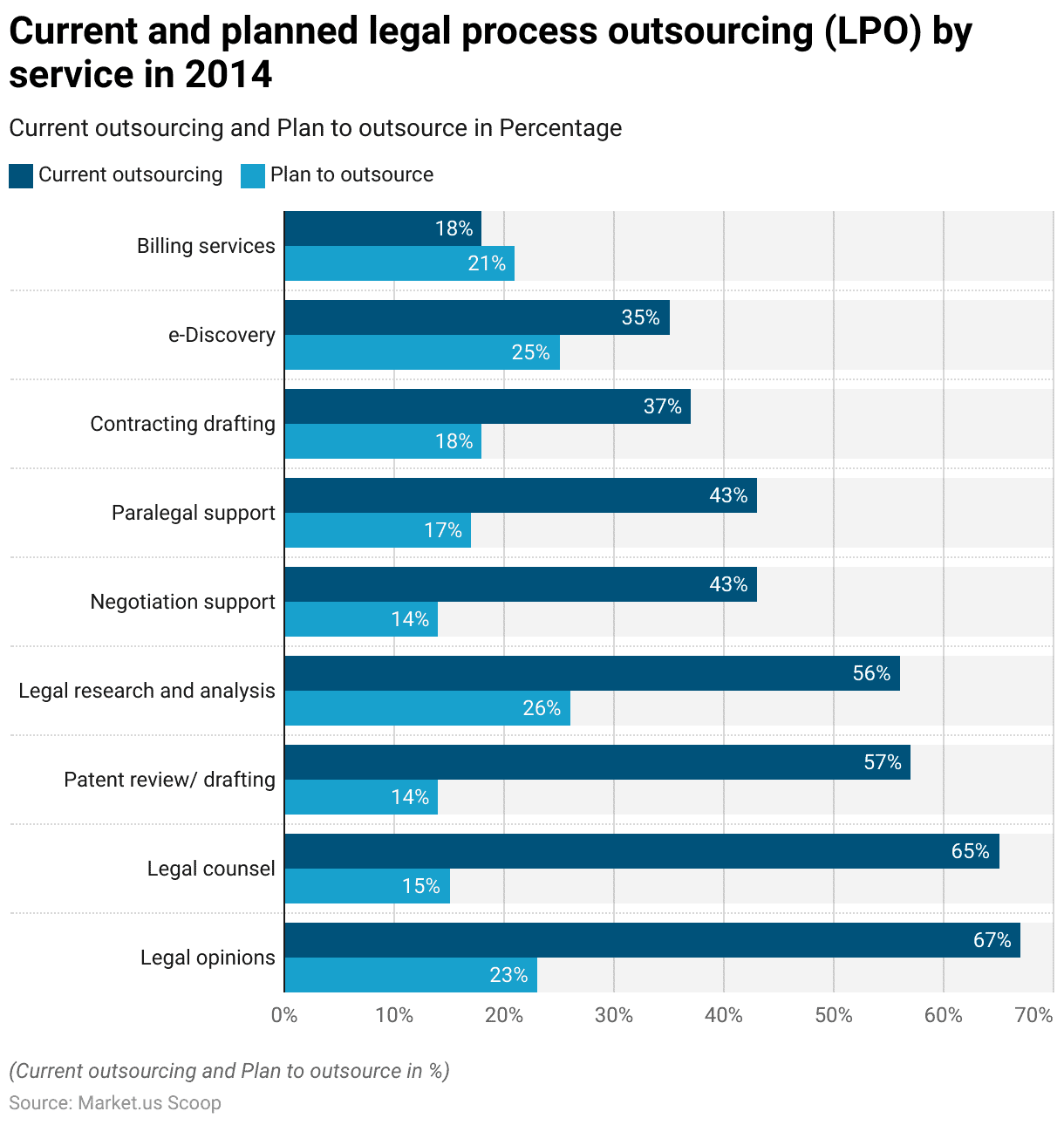
Legal Process Outsourcing Provider Statistics
LPO Employee Headcount – By Service
- The distribution of employee headcount in the Legal Process Outsourcing (LPO) sector is varied across different service towers.
- Litigation services account for the largest share, with 26% of the total LPO workforce.
- Intellectual Property (IP) services follow with 14%, while Corporate Compliance services employ 12% of the workforce.
- Procurement services represent 9% of the employee headcount, and Resources services account for 7%.
- Property services employ 4% of LPO professionals, while Employment services have a 3% share.
- Consulting services constitute 1% of the workforce.
- The remaining 24% of employees are distributed across other LPO services, highlighting the diverse nature of the LPO industry and the range of specialized services it offers.
(Source: Slideshare)
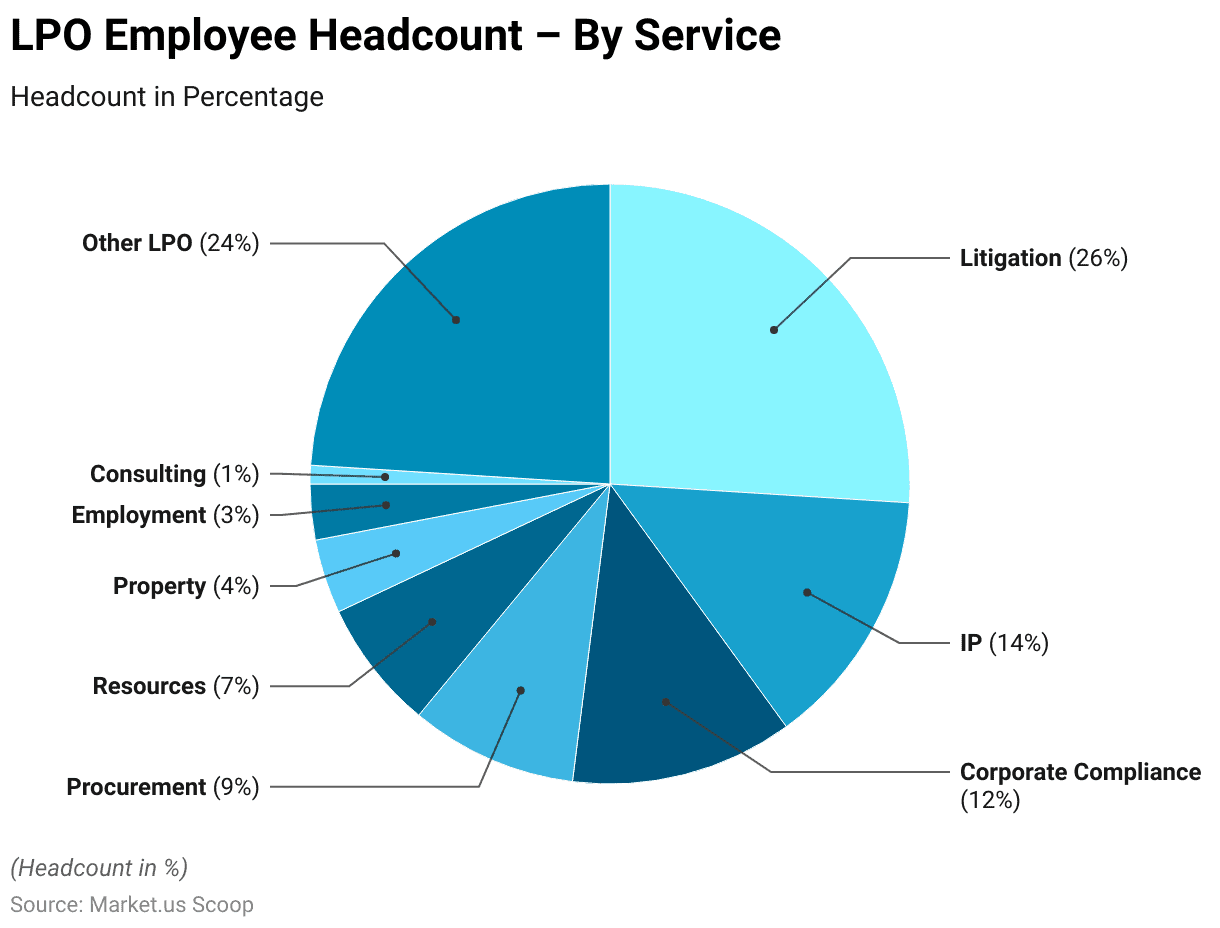
Geographical Reach of Legal Process Outsourcing Providers Statistics
- The geographical reach of Legal Process Outsourcing (LPO) providers is prominently led by India, which accounts for 59% of the market.
- The United States follows with a 22% share, reflecting its significant involvement in the LPO sector.
- The United Kingdom holds 6% of the market, while the broader Asia-Pacific (APAC) region, excluding India, contributes 4%.
- Western Europe represents 3% of the market, and Eastern Europe accounts for 2%.
- Other regions collectively make up the remaining 4% of the market.
- This distribution highlights India’s dominance as a hub for LPO services, supported by its large pool of skilled legal professionals and cost-effective solutions while also illustrating the global spread and growing adoption of LPO services across various regions.
(Source: Slideshare)
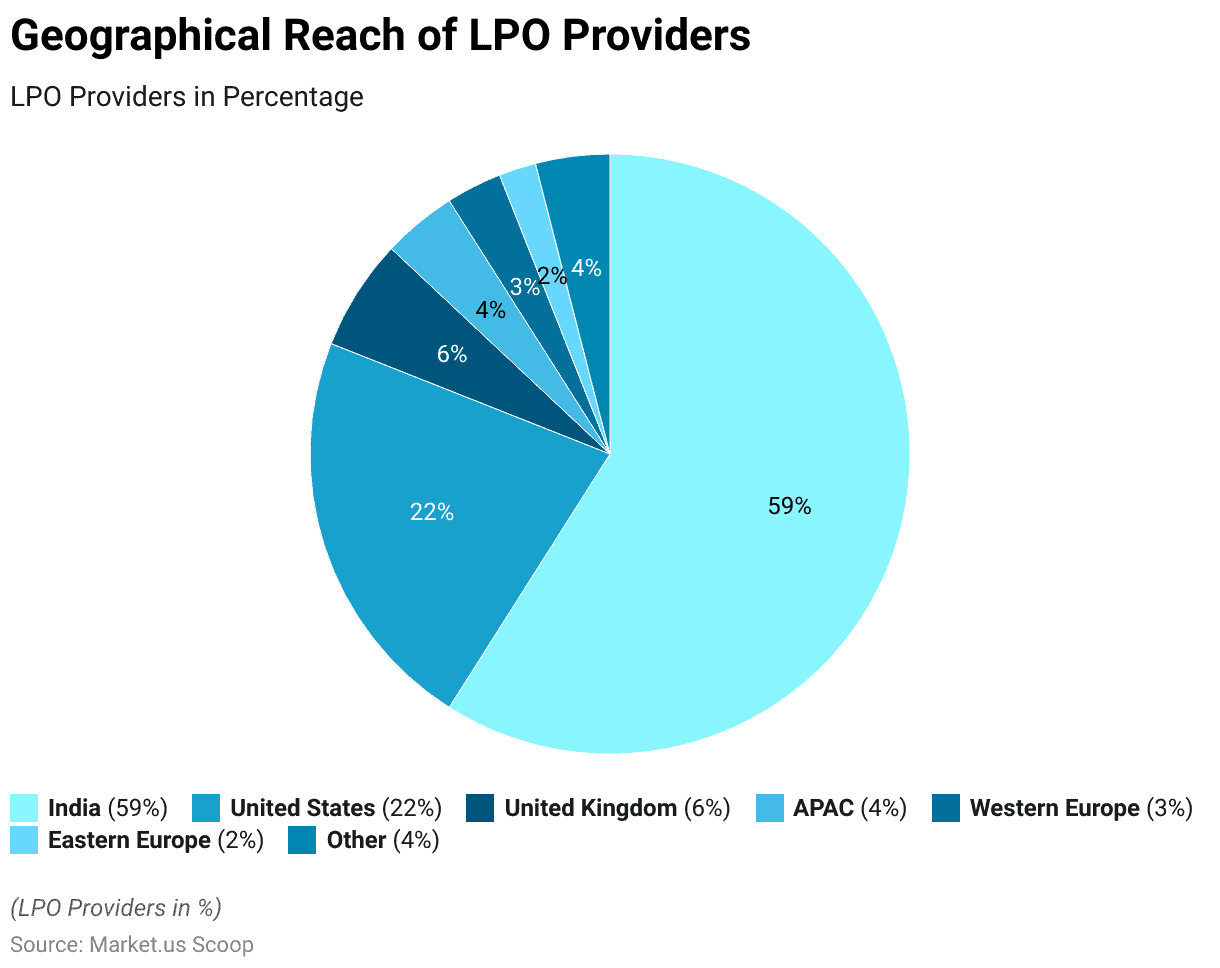
Daily Rates for Legal Process Outsourcing (LPO) Skill Sets
- The daily rates for Legal Process Outsourcing (LPO) providers vary significantly based on the skill level required.
- For onsite services, administrative skills are priced between $60 and $320 per day, with an average rate of $201.
- Paralegal services range from $75 to $400 per day, averaging $249.
- Technical skills command higher rates, ranging from $160 to $2800 per day, with an average rate of $342.
- Fully qualified professionals are priced between $160 and $2000 per day, with an average rate of $530.
- These rates reflect the varying levels of expertise and specialization required for different legal services within the LPO industry.
(Source: Slideshare)
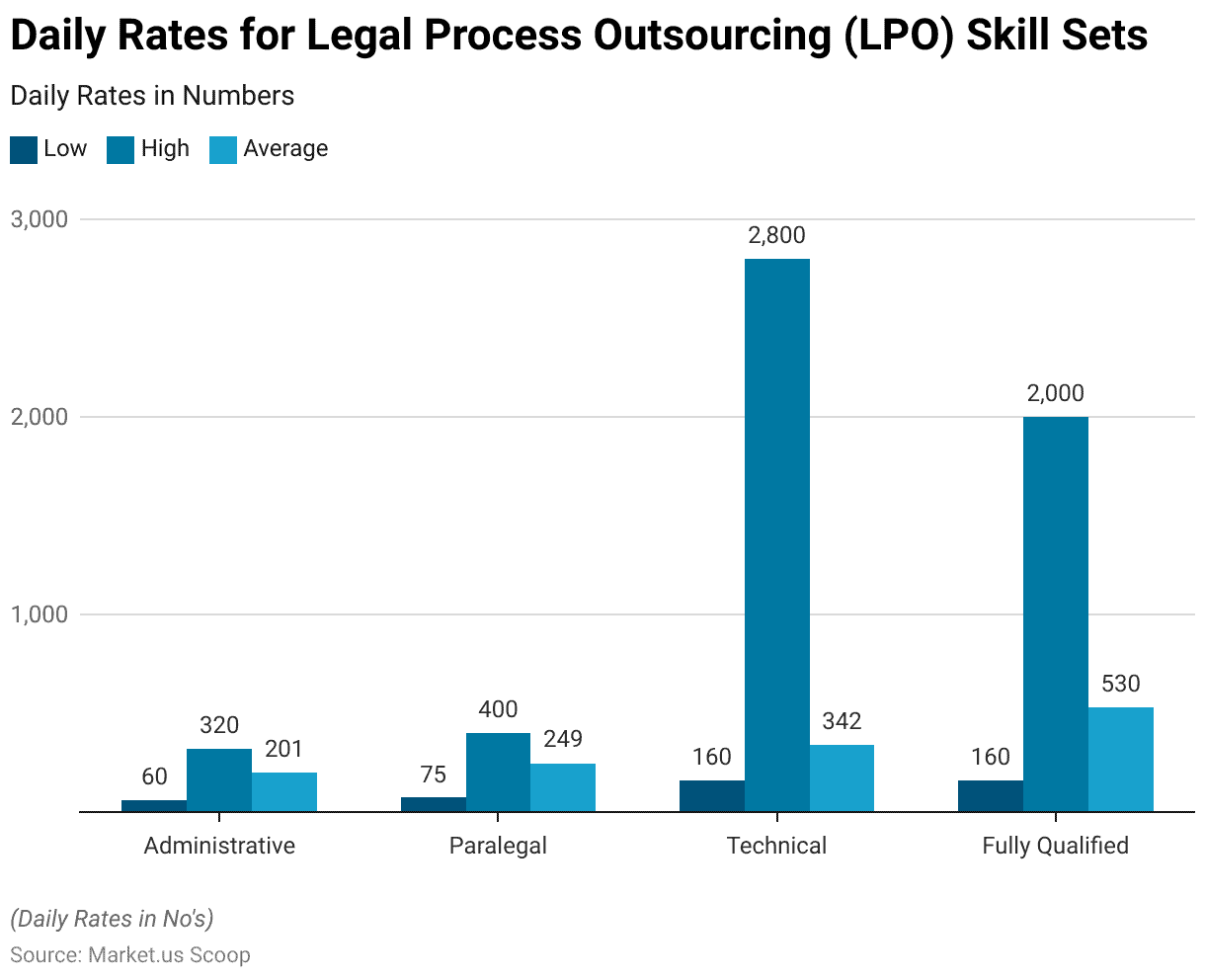
Top Countries and Regions Where Law Firms Prefer to Outsource
- Law firms show distinct preferences for outsourcing legal services to various countries and regions.
- The Republic of Ireland leads the list, with 44.60% of firms favoring it as an outsourcing destination.
- Australia and New Zealand are preferred by 40.10% of firms, while 38.10% opt for the United States.
- Scotland is chosen by 34.70% of law firms for outsourcing, followed by India at 22.30% and South Africa at 21.80%.
- Eastern Europe attracts 10.90% of outsourcing preferences, with Asia accounting for 8.90% and the Philippines at 4.50%.
- This distribution reflects the strategic choices of law firms seeking cost-effective and efficient legal services across diverse geographical regions.
(Source: Slideshare)
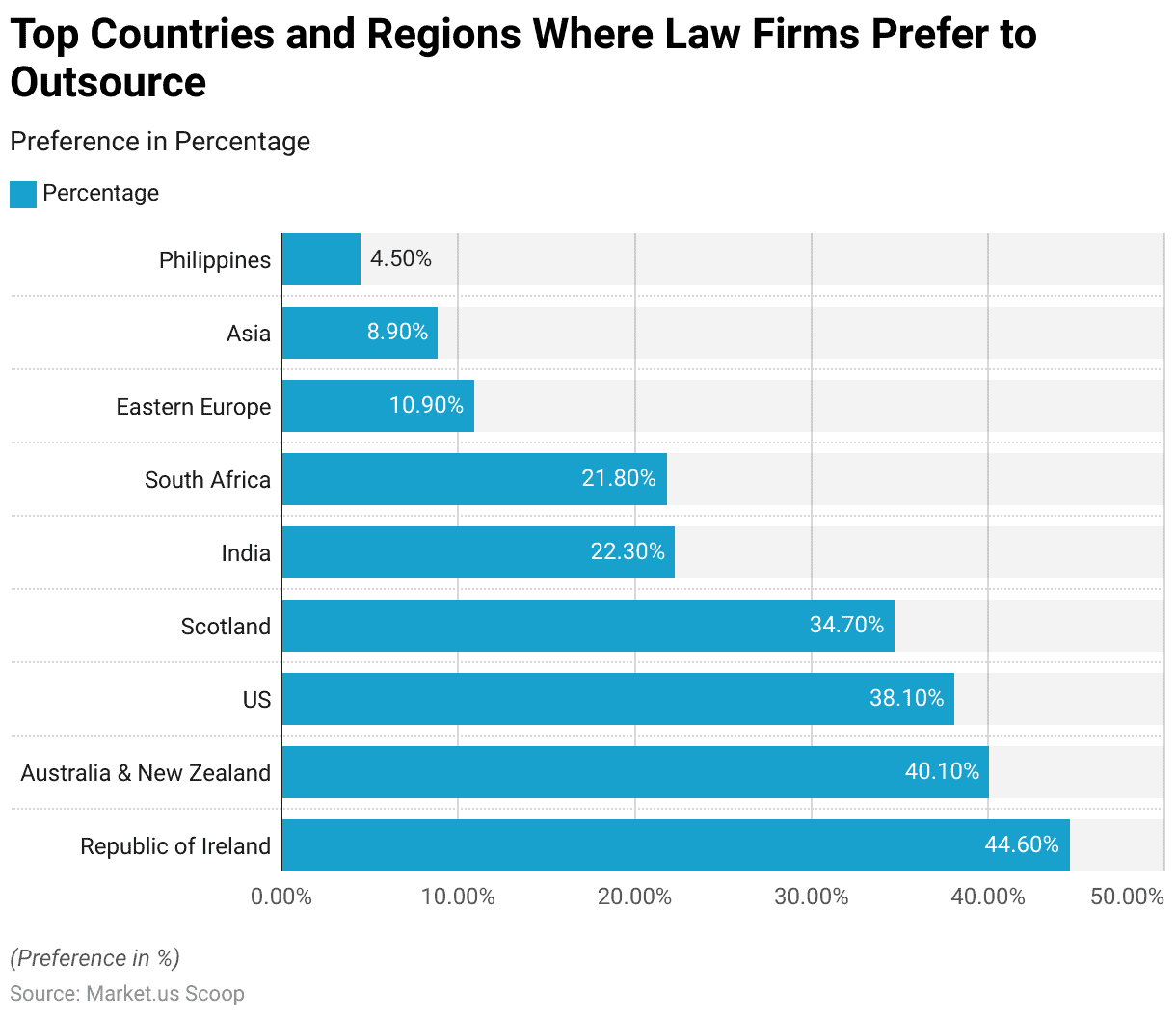
Time Management in Legal Process Outsourcing
Tasks In-House Lawyers Wish They Had More Time to Do
- In-house lawyers express a strong desire to dedicate more time to various tasks that enhance their strategic and operational effectiveness.
- According to a survey, 28% of respondents wish they had more time to conduct strategic planning. While 27% would like to focus on improving internal processes, management, and efficiencies.
- Nineteen percent of in-house lawyers aim to increase their interactions and coordination with the business.
- Improving the legal skills of their staff is a priority for 13% of respondents, and 8% wish to engage more in negotiating large deals.
- An additional 6% of in-house lawyers have other tasks they would like to allocate more time to.
- These insights highlight the areas where in-house legal professionals seek to enhance their contributions to their organizations.
(Source: Association of Corporate Counsel)
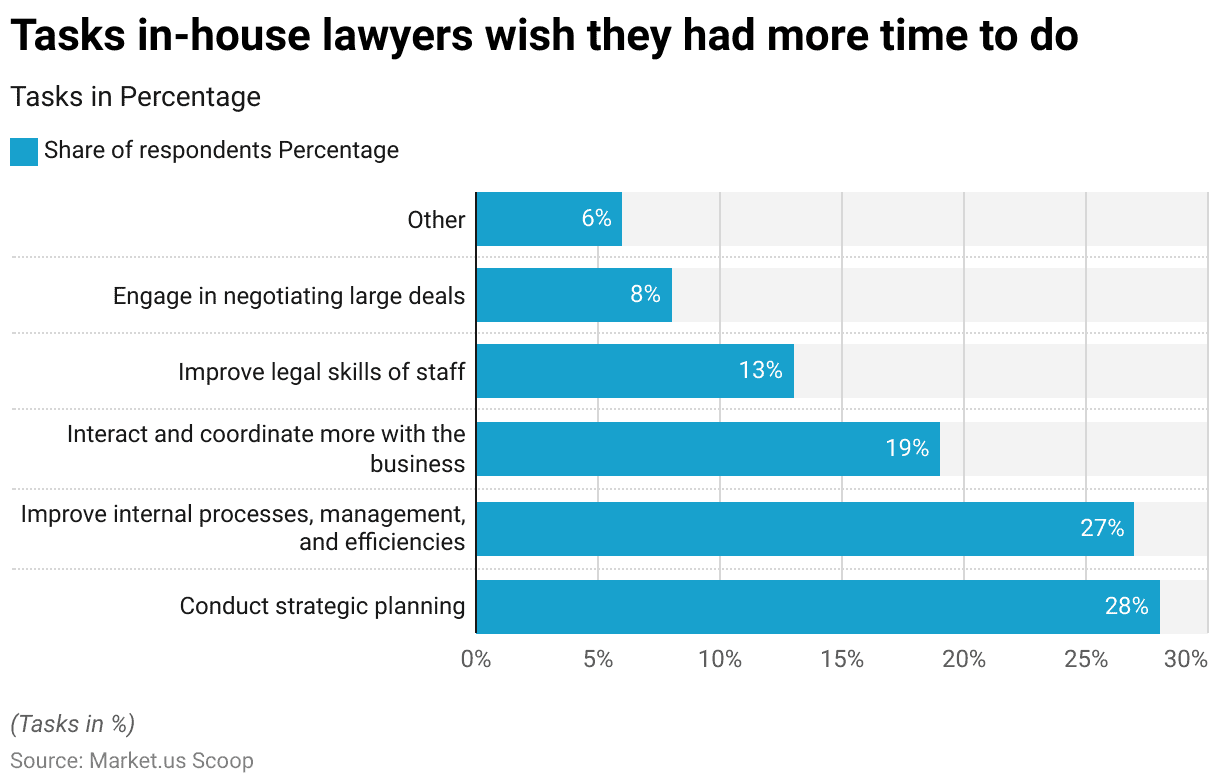
Tasks In-House Lawyers Wish They and Their Staff Could Stop Doing
- In-house lawyers and their staff express a desire to eliminate certain tasks that consume significant time and resources.
- According to a survey, 33% of respondents wish to stop performing routine work. Such as handling low-value or low-risk contracts and filings.
- Document review, management, and production are tasks 24% of respondents would like to eliminate.
- Data entry and management are cited by 20% of in-house lawyers as tasks they wish to stop doing.
- Contract review is another area identified by 8% of respondents, while 6% want to cease responding to subpoena requests.
- Additionally, 4% of in-house lawyers wish to stop dealing with abandoned or unclaimed property, and another 4% would like to eliminate quality assurance tasks.
- These findings highlight the areas where in-house legal teams seek to streamline their workload to focus on more strategic and value-added activities.
(Source: Association of Corporate Counsel)
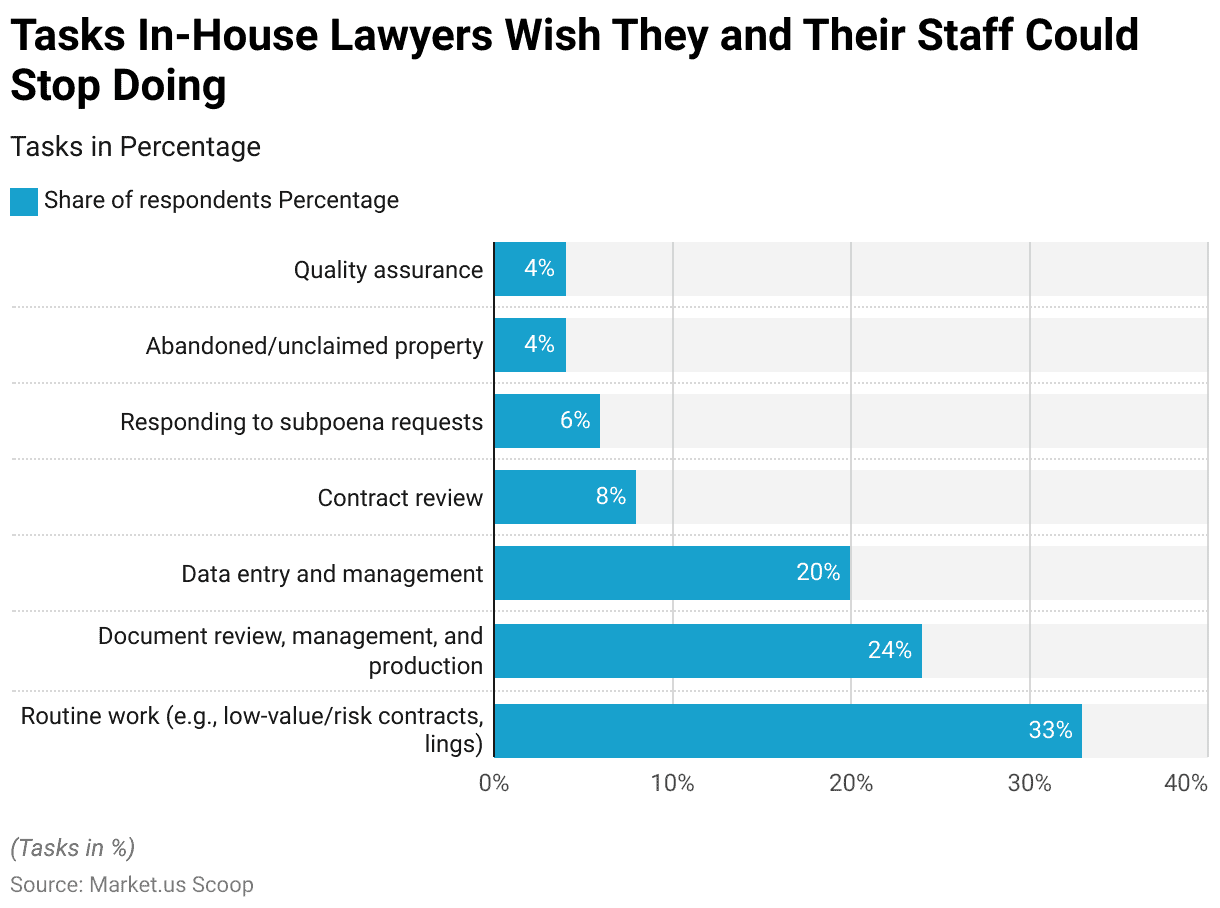
New Trends in Legal Process Outsourcing
- In 2024, the Legal Process Outsourcing (LPO) market is experiencing several notable trends driven by technological advancements and shifting business needs.
- One major trend is the increased adoption of Robotic Process Automation (RPA), which streamlines repetitive tasks such as data entry and document management, thereby enhancing efficiency and reducing errors.
- Additionally, there is a growing focus on cybersecurity outsourcing as businesses seek specialized expertise to protect sensitive data amidst rising cyber threats.
- Cloud outsourcing continues to gain traction, offering scalability and flexibility for various legal processes, including data storage and software development.
- Another significant trend is the emphasis on sustainability in outsourcing. Where companies seek LPO partners that align with their environmental, social, and governance (ESG) goals.
- Data analytics outsourcing is also on the rise, enabling organizations to leverage vast datasets for informed decision-making and strategic insights.
- The LPO market is projected to grow significantly, with a compound annual growth rate (CAGR) of 24.1% from 2023 to 2033, reaching an estimated value of $132.6 billion by 2033.
(Sources: Superstaff, Jindal, CLIO, market.us)
Recent Developments
Acquisitions:
- Marlowe Plc’s Acquisition of Cedrec Information Systems: Marlowe Plc acquired Cedrec Information Systems. A provider of environmental, health, and safety data, for approximately $3.76 million in May 2022.
- This acquisition strengthens Marlowe’s capabilities in offering comprehensive outsourced business services.
New Product Launches:
- UnitedLex’s Launch of Contract Data as a Service (CDaaS): In October 2022, UnitedLex introduced a new service called Contract Data as a Service (CDaaS).
- This innovative solution uses data science and technology to transform legal contract language into organized data, enabling better business decisions and ensuring compliance.
Funding:
- Investment in AI and Data Science Capabilities: Companies like UnitedLex are investing in AI and data science to enhance their service offerings.
- These investments aim to improve efficiency and provide more advanced legal processing solutions, helping clients manage complex legal tasks with greater accuracy and speed.
Innovation in Legal Services:
- Deployment of Document Automation and NLP: Law firms and LPO providers are increasingly adopting document automation and natural language processing (NLP) technologies.
- These innovations help streamline legal document management, reduce manual workloads, and improve overall service delivery.
Strategic Partnerships and Collaborations:
- Expansion of Legal Service Centers: LPO providers are expanding their service centers in emerging markets like India, the Philippines, and South Africa.
- This expansion helps meet the growing demand for outsourced legal services while leveraging cost advantages in these regions.
Conclusion
Legal Process Outsourcing Statistics – The Legal Process Outsourcing (LPO) market is experiencing rapid growth, driven by technological advancements and evolving business needs.
Key trends include the adoption of Robotic Process Automation (RPA) for efficiency. It increased cybersecurity outsourcing for data protection, and cloud outsourcing for scalability.
There is also a strong focus on sustainability, with companies seeking LPO partners that align with their ESG goals.
Data analytics outsourcing is gaining traction, enabling better decision-making. The market is projected to grow at a compound annual growth rate (CAGR) of 24.1%, reaching $132.6 billion by 2033.
FAQs
Legal Process Outsourcing (LPO) involves transferring legal services, such as document review, legal research, and contract management, to external service providers, often located in different countries. This allows law firms and corporations to reduce costs and improve efficiency by leveraging specialized expertise and lower labor costs.
The primary benefits of LPO include cost savings, access to specialized legal expertise, improved efficiency, and the ability to focus on core business activities. By outsourcing routine legal tasks, organizations can reduce overhead costs and benefit from around-the-clock services provided by offshore teams.
Commonly outsourced tasks in LPO include litigation support, e-discovery, legal research, contract drafting and management, intellectual property services, and compliance assistance. These tasks are often routine and time-consuming, making them ideal candidates for outsourcing.
India is the leading destination for LPO services, accounting for 59% of the market, followed by the United States (22%) and the United Kingdom (6%). Other notable regions include the Asia-Pacific (4%), Western Europe (3%), Eastern Europe (2%), and the Philippines (4%).
Technology is significantly impacting LPO through the adoption of Robotic Process Automation (RPA), cloud outsourcing, and advanced data analytics. These technologies enhance efficiency and improve data security.


